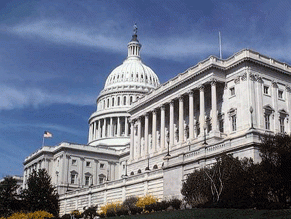|
World Jewish News

U.S. Capitol Building (photo by blog.tmcnet.com)
|
Senate letter urging tensions tamp-down gets 76 signatures
14.04.2010, Israel and the World More than three quarters of the U.S. Senate urged the Obama administration not to allow tensions with Israel to harm relations or the prospects of a return to Israeli-Palestinian peace talks.
"We write to urge you to do everything possible to ensure that the recent tensions between the U.S. and Israeli administrations over the untimely announcement of future housing construction in East Jerusalem do not derail Israeli-Palestinian peace negotiations or harm U.S.-Israel relations," said the letter sent Tuesday to Hillary Rodham Clinton, the U.S. secretary of state, and signed by 76 senators. "In fact, we strongly believe that it is more important than ever for Israel and the Palestinians to enter into direct, face-to-face negotiations without preconditions on either side."
The letter refers to tensions that erupted more than a month ago, when the Israeli government announced a major building launch in eastern Jerusalem during what was to have been a friendly visit by Vice President Joe Biden.
A companion letter in the U.S. House of Representatives garnered 333 signatures in 72 hours.
The American Israel Public Affairs Committee lobbied hard for both letters, which were circulated to coincide with its March 21-23 annual policy conference.
The Senate letter, initiated by Sens. Barbara Boxer (D-Calif.) and Johnny Isakson (R-Ga.) stops short of the House letter's appeal to the Obama administration to keep disagreements with Israel behind closed doors. Both letters blame the Palestinians for the impasse in talks, however.
"Palestinian leaders are refusing to enter into direct negotiations with Israel," the Senate letter said. "Instead, they have put forward a growing list of unprecedented preconditions. By contrast, Israel’s prime minister stated categorically that he is eager to begin unconditional peace negotiations with the Palestinians."
AIPAC commended the letter, noting that it came the same day that Gen. David Petraeus -- who commands U.S. Central Command, which includes the Middle East -- said that Israel "has been and will be an important strategic ally of the United States."
AIPAC's statement "strongly applauds this enormous outpouring of support for the special relationship between the United States and Israel, which is rooted in shared values and common interests, including democracy, tolerance, the rule of law and the pursuit of peace."
JTA
|
|
